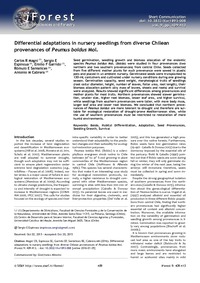Differential adaptations in nursery seedlings from diverse Chilean provenances of Peumus boldus Mol.
Autor
Espinoza-Meza, Sergio
Santelices-Moya, Rómulo
Cabrera-Ariza, Antonio
Magni, Carlos R.
Garrido, Emilio F.
Fecha
2016Resumen
Seed germination, seedling growth and biomass allocation of the endemic species Peumus boldus Mol. (Boldo) were studied in four provenances (two northern and two southern provenances) from central Chile. Seeds collected from five different mother plants for each provenance were sowed in plastic pots and placed in an ambient nursery. Germinated seeds were transplanted to 130-mL containers and cultivated under nursery conditions during one growing season. Germination capacity, seed weight, morphological traits of seedlings (root collar diameter, height, number of leaves, foliar area, root length), their
biomass allocation pattern (dry mass of leaves, shoots and roots) and survival were analyzed. Results showed significant differences among provenances and mother plants for most traits. Northern provenances showed slower germination,
smaller size, higher root biomass, lesser leaf area, and higher survival, while seedlings from southern provenances were taller, with more body mass, larger leaf area and lower root biomass. We concluded that northern provenances of Peamus boldus are more tolerant to drought and therefore are suitable for ecological restoration of drought-prone Mediterranean sites, while the use of southern provenances must be restricted to restoration of more humid environments.
Fuente
iForest, 9, 409-413Identificador DOI
doi.org/10.3832/ifor1893-008Colecciones
La publicación tiene asociados los siguientes ficheros de licencia:


